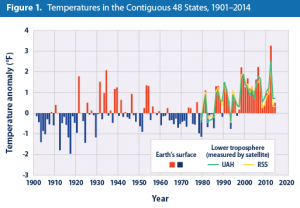July 2016 in Delaware – and in many parts of the world – is on track to break local and global records as one of the hottest summer months in recent years, climate scientists say.
“Not only has it been warm, but it’s been extremely humid,” said Delaware State Climatologist Dan Leathers. “In Wilmington, for July so far this year, we’re about 2.2 degrees above normal. For Georgetown, almost 3 degrees.”
High average temperatures have been breaking records almost every year, with 2005 to 2014 noted as the warmest decade on record since worldwide thermometer-based observations began, data from the U.S. Environmental Protection Agency show. The first half of 2016 has already surpassed high temperatures recorded globally in 2015, and June 2016 was 1.62 degrees warmer than June 2015, data from the National Oceanic and Atmospheric Administration show.
“The data shows the planet’s been warming since the 1880s. There’s very little question about that,” Leathers said. “But the big thing about Delaware to remember is that there’s been a long-term, general upward trend, but there’s a lot of variability from year to year and season to season. We’ve seen an increase in temperature of about 0.2 degrees per decade.”
For most people, hot summer weather just means it's time to break out the shorts and crank up the AC. But for many who are unable to cool down their homes, or who work jobs that require them to be exposed to extreme heat, above-average temperatures can be dangerous and even life-threatening.
The Centers for Disease Control and Prevention say muscle cramping is often the first sign of heat-related illness, but may lead to more severe heat exhaustion or stroke. Symptoms of heat exhaustion include heavy sweating; weakness; cold, pale and clammy skin; fast or weak pulse; nausea or vomiting and fainting.
Anyone experiencing these symptoms should move to a cooler location, lie down and loosen clothing, apply cool, wet cloths to the body and sip water. If the heat illness results in vomiting that continues, seek medical attention immediately.
More severe cases can result in heat stroke, which is life-threatening. Heat stroke symptoms include a high body temperature (above 103 degrees); hot, red, dry or moist skin; a rapid and strong pulse; and possible unconsciousness.
In these cases, people should call 911 immediately, move the person to a cooler environment, and use cool cloths or a bath to help reduce the person's body temperature.
Extreme heat claims more U.S. lives each year on average than hurricanes, lightning, tornadoes, earthquakes and floods combined, the Center for Climate and Energy Solutions states. The center estimates that nationally about 600 people die each year from heat-related illness such as heat stress and hyperthermia, which particularly affect the young, elderly and the sick.
“In the past few weeks, we have had several cases of patients complaining of dizziness, weakness, headache, muscle aches, vomiting as well as fainting spells due to heat-related exposures,” said Dr. Nicholas Perchiniak of Beebe Healthcare's emergency team. “These types of complaints often increase in quantity and severity based on extreme heat conditions.”
Perchiniak said it's crucial to limit extended exposure to the heat and stay hydrated, especially for the very young and very old, to prevent heat-related illness.
As of July 25, there have been eight days recorded above 90 degrees this month – more than any July since 2012 – according to data from the Delaware Environmental Observing System's Rehoboth Beach station. Max heat index – a measurement that shows what it actually feels like when air temperature and relative humidity are combined – exceeded 100 degrees six days this month. A 109.2-degree heat index on July 25 exceeded any recorded heat index in the month of July since July 22, 2011, which felt like 113 degrees, DEOS data show.
“It’s just been nasty,” Leathers said. “It’s July in Delaware.”
Delaware's climate normals for July – usually the hottest month of the year in the First State – show a normal high of 86.9 degrees and an average monthly temperature of about 78 degrees in Lewes, according to the Office of the Delaware State Climatologist.
The weekend forecast from the National Weather Service shows temperatures dropping this weekend, although highs will still reach the mid- to high 80s. There is a 40 to 60 percent chance of thunderstorms Friday, July 29, through Sunday, July 31.






















































